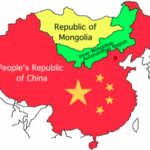If nations really could decide….
These are excerpts from the article, which can be read in full at Gefira Financial Bulletin #68.
…to determine their own fate, as they can’t! One of the noble slogans of the United Nations is that nations can determine their own existence: whether they want to be independent or perhaps confederated, whether they want to belong to this or that alliance. It seems that most people in the West are convinced that the self-determination of nations is not just a slogan, but a reality, a political everyday reality, and if no longer a reality, then probably somewhere in the Third World, while in the West this principle is not only accepted as right but also implemented everywhere and always.
Let’s start with the observation we have made many times before: the very name United Nations Organization is deceitful and misleading. For we are not dealing with united nations, but with united states. A nation is the Russians, Turks, Hungarians, French, Chinese, Koreans, Germans, Kurds, Zapotecs, Zulus, and Yakuts, to name just a few. A nation is communities united by blood ties, a common legendary and biological (which most likely means the same thing) ancestor, and therefore a common language. One can argue about the definition of a nation, about where one nation ends and another begins (the continuum Russians-Belarusians-Ukrainians, the continuum Serbs-Croatians-Bosnians), but no one in their right mind would argue that a nation becomes a conglomeration of various ethnic groups brought together ad hoc by a newly formed political or state body. In other words, if we separate a few million Poles, Czechs and Germans from neighboring territories and unite them into one political organism, into some new state, under one common government, having one law, we will not, after all, form a nation, although some will claim so. The English word “nation” here is an excellent example of how language can distort reality. Latin in origin, the word “nation”, which derives from the word “to give birth, to birth” (compare with Nativity, native, innate) shows what a nation really is, and what a nation is not. So, going back to the example given above, the ad hoc combination of Poles, Czechs and Germans in a single state body will not make them into a nation, and certainly not in an instant or even for many years.
[…]
A nation is not a state, and a state is not a nation
[…]
④ Serbia – Bosnia and Herzegovina – Montenegro. Consider the fact that Serbs, Bosnians, Montenegrins (and also Croats!) speak one and the same language, and the minor regional differences are smaller than those we have for the different varieties of German in German territory or English in the United Kingdom or the United States. What do we see in the Balkans? We see a Serbian nation within the Serbian state and that Serbian nation within the autonomous Republika Srpska that is part of the state of Bosnia and Herzegovina, whose other inhabitants, those living outside the autonomous Republika Srpska, are distinguished as a nation(?) solely on the basis of religion, on the basis that they are either Serbs or Croats whose ancestors opportunely – when these territories were under Turkish rule – converted to Islam! Oh, and we have a new nation! A Serb who professes Islam is no longer a Serb but a Bosniak! Interestingly, a German Catholic and a German Protestant or – increasingly nowadays – a German Muslim and a German atheist are not four – FOUR – nations! And a simple question: why can’t the Serbs of the autonomous Republika Srpska that constitutes a part of Bosnia and Herzegovina join Serbia proper? Could it be that they don’t want it? Where is that famous self-determination of peoples sanctified by the UN and all those human rights in general? Wouldn’t it be useful here to hold a referendum and ask the will of the Bosnian Serbs where they would like to live, whether in Bosnia and Herzegovina or perhaps in Serbia proper? Somehow in this case the referendum is not desired. Why?
[…]
⑥ Romania – Moldova. If one knew history or wanted to know history, one would know that (a) Moldavia (present-day Moldova) and Wallachia were the two state-forming principalities from which Romania was formed, and would know that (b) Romanian is spoken in Moldavia (Moldova). That should be enough. Between World War I and World War II, Moldova was part of Romania, then was seized by the Soviet Union and became one of the Soviet republics, and after the collapse of the USSR – an independent state. Don’t Moldovans want to belong back to Romania? Unfortunately, no one asks their opinion, yet the self-determination of nations is sanctified in all those international grandiose declarations…
[…]
⑪ Mongolia – China. How many of the readers of this article know that Mongols make up 95% of Mongolia’s population, and that this is in absolute numbers three million people, while that the vast majority of Mongols – as many as TWENTY-FOUR MILLION – live outside Mongolia, in neighboring China, where they have an autonomous province? What do we think, would the Mongols of China not want to belong to one independent state together with the Mongols of Mongolia? Is it normal that a tiny fraction of a nation has a state, while the vast majority of that nation – though living in a compact area – does not have a state? Is it just? Is this the principle of self-determination of nations at work? Is it possible that three million Mongolians wanted to have their own independent state, while twenty-four million preferred to be subject to the Chinese?
[…]




